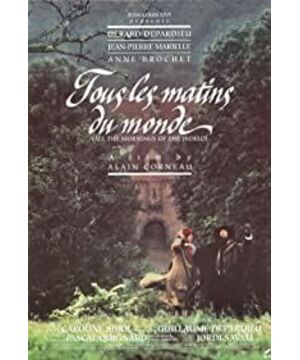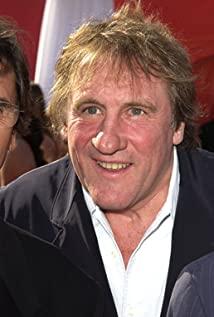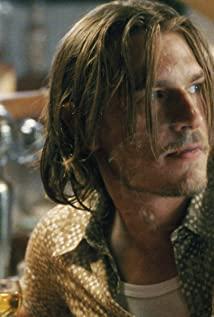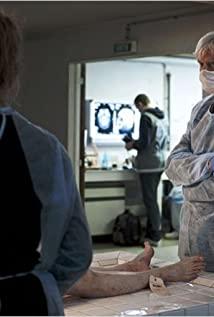At the beginning of the film, the court musician conductor Marais, wearing a huge wig and his face covered in pale powder, fell into deep fatigue. He heard his deputy repeatedly teach his musicians how to play, and felt that everyone was cautiously waiting for him to speak. . He was exhausted and depressed, and he just said in a weak voice, "be a little lower, I like a little lower, what do people in the dark need, I want to listen to the music in a low voice", and weakly played the piano a few times, Then, while waiting for the other musicians to leave, he stopped everyone and started talking. "I have nothing in my life, nothing but gold and shame, only he is music, as if the oil lamp has run out but I have to continue to take care of the world, he is my teacher•••••••”
his teacher Monsieur de Sainte-Colombe (hereafter referred to as the teacher) was the greatest violin player of his time (1640-1700). His wife died and he lived in seclusion with his two daughters. He misses his wife deeply and loves Violgen deeply. He built himself a small wooden house and locked himself in the wooden house for a long time, playing the piano, remembering his wife, and when he was playing the piano, he could see the vision of his wife. He talks to him, sad and happy. Later, a handsome and talented young man, Marais, came to study with a teacher and fell in love with his eldest daughter. For the sake of gold and honor, he chose to become a court musician, and left his eldest daughter and unborn child. When the eldest daughter was about to die, Marais came to visit and left in a hurry. The eldest daughter hanged herself. After the death of the eldest daughter, the teacher did not play the piano for half a year. He stayed in the cabin and talked to himself, and Marais also lived in guilt and yearning for real music. Finally, one night, the two of them met again. At the wooden house, the teacher gave Marais the first lesson, and the two clarified the question of "what is music for". Ensemble a piece of "Tomb of Sorrow", each mourning the souls of the dead.
The movie is very beautiful, every frame is like a beautiful western pastoral oil painting, the deep voice of Violtine has been pervading, the four protagonists (the teacher, Marais, the eldest daughter, the youngest daughter) are not only very classical in their temperament and appearance. With the character in the play and its fit, of course, this is an aesthetic film, a musical film, and the previous film reviews have narrated this point. From my own standpoint, it's also a very good film about intimacy and emotional struggles.
Let’s talk about the younger daughter first. The image of the younger daughter is rarely mentioned in the plot introduction and other film reviews. After all, the plot on her body is not related to “music”, and the connection with the narrator Marais has no teacher and eldest daughter. closely and therefore often ignored. But the story that happened to her is the most interesting and closest to us ordinary people. The style of the whole film and the characters of the other protagonists are reserved and restrained, only she is lively, straightforward, warm and simple, as if her red hair is particularly bright in the whole light green pastoral scenery. And her relationship with her father is worthy of interest to every psychologist. There are several plots in the movie that focus on portraying the psychology of the youngest daughter. The first one was when the mother just passed away and she was only 5 years old. The father was going to move the piano and some furniture into the cabin. After the nanny and the eldest daughter helped carry them, they left without looking back. She looked at her father in a daze, and her father looked back at her. The two didn't say a word until the nanny turned around and pulled the little girl away. Her nostalgia for her father is direct and unabashed. And the father, although he loves her deeply in his heart, can't express it in a "normal" way. Father and eldest daughter communicate through music, while the youngest daughter is an outsider from beginning to end. When her father taught her sister to play the piano, the younger daughter desperately tried to attract the attention of both her father and her sister, and they gave her complete neglect. Neglect is the most fatal injury in the process of human growth. Later, in order to make up for the little daughter, the father made a special trip to customize a smaller violin for her daughter. When the little daughter got the violin, she was so moved that she burst into tears. Her expression of emotions was very straightforward and moving. However, this touching scene has just ended. In the next scene, a few years have passed. When the father and daughter played, the father and the eldest daughter had a good understanding from the beginning to the end, and they had a tacit closeness. They never looked at the little daughter from beginning to end. The daughter has also been unable to join the performance. Unlike when she was a child, the younger daughter no longer showed anger or frustration. She just smiled and looked at her father and sister, and people no longer knew what she was thinking. She no longer deliberately caught her father's attention by being ignored, because she knew it was all in vain. She is a passive alien to her father and his music, and she also gains worldly happiness, marrying the son of a musical instrument dealer, and when the last scene appears, she is already gorgeously dressed and vulgar. Her sister, on the other hand, took a very different path from her.
There is no doubt that the eldest daughter is more like the teacher's deceased wife. Except for the different hair color, her appearance, temperament and cold expression are exactly the same as the wife in the teacher's memory. The film does not focus on the father-daughter relationship between the eldest daughter and the teacher, only two violin ensembles, showing that the two have a similar understanding of music. The eldest daughter is undoubtedly very talented in music, but instead of going the way of a musician, she went to the role of a "woman". That is, complete self-definition with a feminine body and nature. The first time she saw Marais, she seemed very interested in him. Unlike the younger daughter's pure curiosity and liking for Marais, the eldest daughter almost instinctively knew how to use the female body and mind to attract him. For him, she She is determined to win, and she has an amazing desire to control with a weak appearance. She deliberately left the wooden door so small that Marais would have to touch her chest as he passed. He was still bathing in the lake where Marais left the only way, making Marais think he saw her naked back accidentally, all of which made his mind rippling. When Marais quarreled with the teacher and was expelled from the teacher's door, the eldest daughter's comfort and care immediately captured Marais' heart. She not only taught Marais to play the piano, but also took him to the teacher's cabin to eavesdrop. Marais was important, so she helped him unreservedly. She had control over the relationship between the two from beginning to end. Of course, her love is sincere, but not unconditional. Her expectations for love are very high. Even, in my opinion, the reason why Marais left resolutely was because she wanted to pursue prosperity and wealth, and its other The deeper reason is wanting to escape the high-expectation love of the eldest daughter. When Marais proposed to leave, the eldest daughter's expression did not change. She said, "You can go." When Marais finally went to see her, she still looked calm and said, "You came just right, I want to hear the tune you made for me. ••••••Why, all this pain, it's like a lie ". When Marais asked her if she hated him, she replied, "Hate, but I hate myself more. I keep blaming myself because I was devastated by the memory of you. At that time, I used to cry and I was skinny." What made her miserable was not just the departure of Marais, but more importantly, she hated herself for suffering because of Marais, and she did not allow herself to suffer for a man who abandoned her. Because of that, she lost control of herself, and she was afraid of the feeling of losing control. most
There are several scenes in the movie about the nature of music between Marais and his teacher, and the last scene is particularly exciting. At that time, Marais was already the conductor of the court band, but his heart was deeply saddened, and the teacher was even more saddened by the passing of his eldest daughter. Only music is the last salvation for the two. One night, Marais hid outside the teacher's cabin and eavesdropped on the sound of the piano. Finally, he couldn't help but knocked on the teacher's door. The teacher gave him the last and first lesson, "Music is something that cannot be expressed in words, and sometimes it is not entirely human. You understand that music is not for kings, right?" "It's for God" "No , God can speak." "It's for the ear." "Music is the expression of unspeakable emotions, not just listening." "For silence?" "Silence is just the opposite of language." Marais said more Many answered, "Is it for entertainment? For gold? For love? For the pain of love?•••••" The teacher shook his head and denied it. In the end, Marais said, "Then I don't know, but I think it's for the sake of The deceased leaves a glass of wine", which refers to the glass of wine reserved for the deceased wife every time the teacher plays. The teacher said, "Okay, it's very close", and Marais went on to say "Music is for the silent person to vent their feelings, yes For the lost childhood, in order to cover the sound of the shoemaker knocking shoes.” Hearing this, the teacher’s eyes flashed with tears. He knew that his students gradually understood what music was for. Marais’s father was a shoemaker. Marais first studied music. I just want to get rid of the life my father gave me by virtue of music. He wants to sever the connection to the past, and music is his weapon. Marais, who was encouraged by the teacher, went on to say, "Music is for the light that people see before they are born, before they breathe." The teacher held his hand and hoped that he would help him complete the song "Awakening Death" before he died. the tune of the author".
Music is not for anyone in the world. Music with healing properties can only express oneself. Whether it is expressing the sadness of losing a loved one, or expressing the denial of the father, no matter what it is, you can only express the emotions that exist in your heart. When music is played for others, the most beautiful tune is no longer music.
Art psychotherapy emerging in the field of psychological counseling, including music therapy, dance therapy, painting therapy, sand table therapy, etc., all use the superiority of art in expressing emotions. Expressing things, the dance painting sand table is the same. In the consultation room, when voice expression is limited, expressing through artistic methods can help the client "see that ray of light". The premise of this kind of healing expression is that what the art really expresses is himself/herself, and once the client does this with the help of the counselor, healing happens naturally.
View more about Tous les matins du monde reviews











